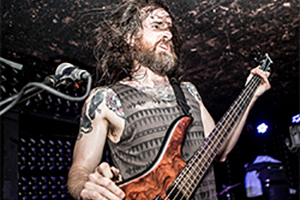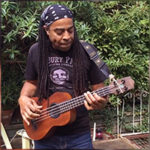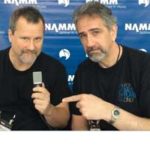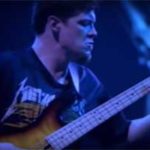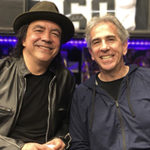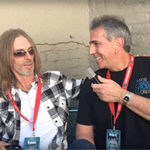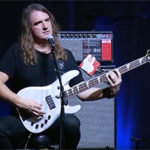Extreme metal bassist describes the transition from Dillinger Escape Plan to Azusa
By Jon Liebman
April 13, 2020
Photo by Rob Wallace
Liam Wilson is perhaps best known as the bass player for The Dillinger Escape Plan, a position he held from 2000 till the band’s breakup in 2017. He has also performed with several other metal and hardcore bands, including Starkweather and Frodus, and has been involved in projects with John Frum and Devin Townsend. Currently Liam is a member of Azusa, an extreme metal group, formed with past members of Extol and Sea + Air.
FBPO caught up with Liam to talk about his influences, career path, bass technique, and more, as well as Azusa’s latest record, Loop of Yesterdays, which was released April 10. It is the follow-up to the band’s critically acclaimed debut offering, Heavy Yoke, which came out in 2018.
FBPO: Let’s start from the beginning. How would you describe your musical upbringing?
LW: I grew up just outside of Philadelphia. Nobody in my family is a musician. Artistically speaking, my parents are pretty normal, non-artists. I’ve always romanticized music and performance in that sense. As a young kid, music was always part of my imaginative play. When I was about 10 or 11, I went to an outdoor, backpacking camp, and I hiked a bunch of the Appalachian Trail. One of the guides was a musician, and I was one of the older, more lucid kids on this trip, so he and I got along pretty well and we would just talk about music.
FBPO: What kind of music were you listening to at that time?
LW: I was really into the Chili Peppers, Faith No More, Metallica, Living Colour, Primus, all that kind of stuff. At that time, I wanted to be a drummer. The guide said, “Oh, that’s cool, but all the bands that you’re talking about also have really rad bass players.” He was a bass player and I guess it was a combination of idolizing him, really connecting with nature, and having a lot of time on my own to do some soul searching at a young, pre-pubescent age. I came home and it was like, “I want to be a bass player.” It took me about a year to really convince my mom that I was serious and it wasn’t going to be like some hobby I’d abandon. We weren’t really that well off, so I had to be pretty sure about the things I wanted to do and where my mom and I decided to delegate our finances.
FBPO: You went straight for the bass?
LW: I went straight for the bass! I realized I needed something portable because I was going back and forth between my divorced parents’ houses, so I knew drums wasn’t going to work. I never really felt like a guitar player. A lot of the kids in my neighborhood played guitar already and, maybe even at a young age I realized I would have a lot more competition for gigs if I played guitar. I didn’t know anybody playing bass, and it would be a lot easier to join a band. Like I said, I always kind of romanticized performing, so I would fantasize about being in a band, and not just being a good bass player. It was also being babysat by MTV in the early incarnation of the channel, where I would see the Guns N’ Roses “Paradise City” video and just be like, “Whoa! Okay.” I’m gonna play a stadium. All I have to do is get good at this thing!
FBPO: Given the band names that you rattled off, I’m assuming of your influences included Flea, Les Claypool, Doug Wimbish…
LW: Doug, to some extent, but I’m way more of a Muzz Skillings dude.
FBPO: Early Living Colour.
LW: Oh yeah. Like Time’s Up is my shit! And Vivid too. Both of those. The Doug Wimbish records, by the time those came out, I was kind of into different stuff. I was getting really into metal. Then it was Death. Individual Thought Patterns, that record was a big thing for me. Cynic was a big thing for me. Living Colour, for sure, and every other name you said. Flea was a big one, Billy Gould from Faith No More was a big one, Cliff Burton and Jason Newsted were big. I think “Crash Course in Brain Surgery” from Garage Days was the first thing I ever actually transcribed. Alice in Chains, Jeff Ament from Pearl Jam. I could just keep rattling them off. John Paul Jones…
FBPO: How did your tastes evolve?
LW: I realized that the music I was listening to already, like Led Zeppelin and the Beatles, all that stuff already had good bass players. I didn’t really have to pivot to have a musician’s ear. I just kind of tuned my musician ear into what I was already listening to. Then, as I started associating with more musicians, I started pursuing lessons and teachers and joining different people to jam and being in bands. That started opening me up to Jaco, and Bela Fleck & the Flecktones, with Victor Wooten. Three Flew Over the Cuckoo’s Nest was a big deal because I had never heard anything quite as intense as that, as a bass player. It was a far cry from Flea. (Les) Claypool was cool. I really appreciated how weird he was. And I mean that in the best way. But he was a songwriter too, so I started getting into that. The next phase was more of that jazz fusion stuff, Mahavishnu and Shakti. Honestly, even something like Phish, A Picture of Nectar. That record blew my mind.
FBPO: As much as your musical interests were expanding, it seems like you pretty much settled largely in the metalcore environment.
LW: I was kind of a latchkey kid, so I had a lot of freedom to go see underground shows in weird places in Philadelphia. I started getting into hardcore and underground music, and getting exposed to that kind of stuff. We had a very vibrant scene. My connection there led me to different people. Eventually, I saw Dillinger in some of the earlier shows in like ’97, ’98, and started getting more into that kind of stuff. Realizing, too, that if I wanted to be in bands, punk was an easy way to do it because that was like the Paul Green School of Rock before there was School of Rock. Everybody was putting on shows, and playing shows and even doing little tours, at like 17, 18, 19 years old. So I kind of elbowed my way into that world.
FBPO: How did you end up joining Dillinger?
LW: I saw them pretty early. Their original bass player, Adam Doll, who was also a big influence on me, was in a car accident, and was paralyzed from the armpits down, so he could no longer play. The Dillinger guys reached out to a mutual friend of mine, asking if he would play. He was more of a guitar player and just didn’t feel like he was the right guy, but had passed my number on to them and vice versa. I was intimidated because I was a fan. By that time, it was also Cynic, and Meshuggah, and Radiohead, and my tastes were getting broader. When I finally connected with those guys, I heard the first couple mixes from the Calculating Infinity record and was just, “Oh man, okay. If this opportunity is there for me, I have to take this, and I’ll figure it out.” I was going to art school. I was studying woodworking, and taking some music classes. The school I went to had a music program, so I would just fill my credit load with as much stuff as I could. I was trying to balance wrapping up my third year of school nicely, so if I wanted to come back I could, and also trying to get myself boot camped for the Dillinger stuff, which required me to play with a pick.
FBPO: How much experience had you had with pick playing before that?
LW: I remember going to my very first bass lesson with a pick, and my teacher was like, “You don’t need that.” So, for the next 17, 18 years, I was just mostly a finger-style dude. I started to pick up on some of that Victor Wooten double-thumb stuff, leaving the pluck part out, but just making sure I could pretend I had a pick, if I needed it for the fast stuff. But that just wasn’t hackin’ it in Dillinger. I had to play with a pick. Thankfully, I’m so glad that I was forced into that because now I love that, seeing guys like Bobby Vega. And even Trevor Dunn, another big one, from Mr. Bungle. That guy shreds with a pick and without a pick! Even though I mostly played with a pick in Dillinger, I still write a lot of my ideas, or work out a lot of my ideas, with just fingers. If I’m like working on my Jamey Aebersold improvisation books, I’m mostly playing with fingers.
FBPO: Ah, so you’re a jazz fan!
LW: I’m an everything fan. I like it all. Like I said, I took some classes at school, and that was kind of like, “Let’s dive into Charlie Parker, let’s dive into more of the bop stuff. Let’s at least learn the theory. I can’t exactly say I’m a strong improviser, just because for the last eighteen years I’ve been so focused on rock and other stuff. But when I get a chance, I’m like, yeah, let me pull out my Bach for Bass, let me pull out my Real Book, let me pull out my Aebersold books, and just kind of pick at it.
FBPO: When I think of Philadelphia, I think of, not so much the scene that you described, but more of the R&B and jazz stuff. There’s such a rich musical heritage in Philly, especially as far as that goes.
LW: Yeah, for sure.
FBPO: How much did those styles rub off on you?
LW: Not as much as you would think. By the time I was old enough to explore that stuff myself, I was more going to hardcore shows. I know that stuff was happening around me. I know that Gerald Veasley was doing his thing as a bass player. I was familiar with that and I would see those cats play.
FBPO: Christian McBride is also from Philly.
LW: Yeah, him too. I would get to see some monsters play. A lot of that stuff was happening, but I wasn’t in that scene, so I didn’t really go that deep. I was more into the universal classics, and some of the weird, more progressive stuff, like Holdsworth. Being in Philly, people would come through there and I would catch stuff. I remember seeing Avishai Cohen with Chick Corea. Avishai’s Gently Disturbed record was a big thing for me too. So I would see a lot of that stuff, but in terms of tapping into the local scene, it felt like a different universe.
FBPO: You had a long run with The Dillinger Escape Plan. How much of an adjustment, if any, did you have to make when you joined Azusa?
LW: With Dillinger, I joined a band that was already happening, so it was a little different. Azusa started as Dillinger was winding up, and it was something that was happening from scratch. Everybody had some notoriety. We all brought our own fans to the table, but we were starting from scratch. As Dillinger was wrapping up, I had a lot of time, almost two years of knowing that the band was going to end, to get my ego in check and to make sure that when I hit that existential windshield, I was ready for it.
FBPO: What would you say are the biggest differences between the two bands?
LW: Azusa was a little bit more of a “Let’s have fun, let’s have a victory lap, let’s take this seriously” feeling. But Dillinger was a little bit more like we were sharks and we smelled blood in the water, and we were out for blood at all times. It was very serious; it was very high stakes. We pushed each other, we pushed the band, we pushed our fans. Any time we could lean into it, we all would. We were all super competitive people, but for the sake of the band. I think Azusa just had a different musical statement. The biggest thing is I’ve been so used to working with more or less the same core of people for the last eighteen years, and now I’m working with a completely different set of people.
FBPO: There must be some geographical challenges with Azusa too.
LW: Yes! I’m working with Europeans, as opposed to Americans. Not only do we have slightly different lifestyles or cultural styles, but there’s a language barrier, sort of. There’s a time difference, so in our conversations, after a certain hour, I know that they’re not going to respond to me. And I almost always wake up with a brick of texts in our group chat because they’ve been up for hours. Dillinger was a hike for me. I would drive two hours to practice, and two hours back, a couple times a week, so I was already used to a big commute to make the band work. But Azusa is a completely different thing. Most of it is done via technology, sending demos and some videos back and forth. We couldn’t do it without it. With Dillinger, I don’t even think Myspace existed when Dillinger started. I don’t think YouTube existed. We were just entering into Napster at that time. So the landscape was very different. It’s a different animal but at the same time, it kind of makes sense with the way society seems to roll these days. And musically, it demands something a little different of me, melodically and stylistically, but for the most part it’s kind of still challenging. It’s fat, technical, very highly crafted, very rehearsed, not very improvised music. And I seem to have a thing for that, the patience for it.
FBPO: Let’s talk about Azusa’s new record, Loop of Yesterdays. How would you say it compares with the band’s first record, Heavy Yoke?
LW: For one, Heavy Yoke came out about 18 months ago, so there isn’t a big window of time here. We were writing Loop of Yesterdays material when Heavy Yoke was still getting mixed, so we kind of just never stopped. In a lot of ways this is a bit of a continuation. When we were starting to focus on what eleven or twelve songs we were going to focus on for Heavy Yoke, we just picked songs that we felt made the best first impression. We wanted things that sounded right together, things that balanced out in what we felt was the proper way. Loop of Yesterdays started with a lot of stuff that didn’t get worked on for Heavy Yoke, and continuing with, “Okay, well then what does this album need more of? Let’s write a couple of those songs.” David (Husvik) and Christer (Espevoll), the drummer and the guitar player, do most of the song writing, and a lot of the material for Heavy Yoke was written before they even talked to me, so it was written from their point of view, not knowing me, not knowing who was going to play bass, not knowing who was going to sing on it. So Eleni (Zafiriadou) and I were kind of, well, “square peg, round hole” is a bit extreme, but we were definitely trying to find our way, trying to get under the hood of what was already there.
FBPO: So when the time came to record Loop of Yesterdays, the band had already gelled?
LW: With Loop of Yesterdays, it was a little bit more like, we had already done twelve songs in the studio together, we knew each other’s strengths, we knew each other’s attitudes, we knew each other’s goals. There were things that David and Christer were interested in doing that I maybe had a gag reflex to because I was like, “Well, I’ve done that already.” I felt like Dillinger did that so many times that I didn’t really want to do it quite like that. And that was kind of a thing for everybody. I think everybody had their things that were bugs, and things that were features that we all had to talk our way through. Other things would happen too. I would come into the studio with my ideas for Heavy Yoke, we’d record like four songs and then we’d get to a section where nobody’s ideas seemed to be good. I would start doing something on the spot and David, the drummer, who ended up recording and producing a lot of it, would be like, “Oh, I didn’t know you could play like that,” or, “Oh, I didn’t know you had that kind of vibe in your toolbox, or in your vocabulary. Had I known that, I would have asked you to do that for these last three songs too because that would have worked.” So this time around, we kind of knew what some of those stylistic perks were.
FBPO: On the new record, there are some punk elements, specifically, the heavy kick-snare, kick-snare thing, but there’s also kind of a Jekyll & Hyde quality, where you go back and forth between nice & easy and full out metal!
LW: Yeah. There’s some fusion stuff, and that kind of like no holds barred feeling of metal, the aggressive thrash stuff, but there’s also, like you said, that Jekyll & Hyde thing, just kind of maintaining an element of surprise and confusion. It’s exciting in the sense of the riffs being energetic, but also exciting in terms of, again, an element of surprise. And I think it’s also just us trying to cram in all of those influences. We want to make a nod to all the things that we like, and also challenge ourselves to make it fit. It’s like we’re saying, “Let’s try to see if we can make these things that shouldn’t fit, these kind of oil and water moments. Let’s try to make it work.”
FBPO: Let’s talk some more about your bass technique. You touched on fingers versus pick, but what advice can you impart to our online students here at For Bass Players Only?
LW: Have patience and enjoy the process, and don’t expect it to happen immediately. Everybody wants to just kind of “get it.” I think that people tend to move on from things too quickly and try to “Swiss Army Knife” it. Fast is just slow sped up, so take things slow, focus on the basics. It’s really easy to have “option paralysis,” especially in the modern world. Play along with things. Even if there’s a bass player on there, play anyway. Don’t just listen to it; play along.
FBPO: Tell me about your gear.
LW: I have tried a lot of different things. The things that I don’t leave home without are my two Zon “Sonus” custom 4-strings that I adore. They’re my two go-to axes. And if I could only choose one pedal, it would be a SansAmp Bass Driver.
FBPO: Tech 21!
LW: Yeah! For sure. Another name is Rex Brown from Pantera. I think that that guy has the perfect bass growl, especially with a pick. He and Dave Ellefson have such great pick tone. So Tech 21, the SansAmp Bass Driver is a big thing for me. I probably have three or four Bass Drivers because I’m scared for the day that they just stop making them. Their stuff is built like a tank, for the most part. I love their stuff!
FBPO: What about the rest of your rig?
LW: Occasionally, I would double up the SansAmp with an Aguilar Tone Hammer, and I would keep my SansAmp as kind of like a “dirty clean” and the Aguilar would be like my “full dirty.” And then I would usually pump that into a ’71 or ’72 Ampeg classic. I use Dunlop picks, some Darkglass stuff, and Ernie Ball strings.
FBPO: What about the future? Is there anything else that you’ve always wanted to do that you just haven’t gotten around to yet?
LW: In terms of accolades, I guess it would be lovely to have a Grammy. I don’t know how much I truly care, but it would certainly look good on my CV! I would love to have an opportunity to play more improvised music. Everything that I’ve done has been very rehearsed. In saying that, I also recognize that it’s not really my strongest suit. I’m not saying that I can’t do it, but it’s not something I’ve pursued. Let me do things that I haven’t done, or even considered doing, getting more into that avant jazz, free jazz. The John Zorn world would be kind of cool. And working on other instruments. I would love to get into playing more guitar, playing drums. I have pretty much one of everything around me, and I can kind of hunt and peck on it, but I’m not fluent. I would love to get more into teaching and mentoring and give back a little bit more. Another thing that I’m working on is transcribing two Dillinger albums. That sheet music should be out, I would love to say in a few months, but who knows how long it’s actually going to take. It’s nice to hone my sight reading and transcribing chops.
FBPO: What would you be if you weren’t a bass player?
LW: I would like to say that I’m kind of doing it. I’ve always kept my foot in a few different doors. I know a lot of people who just go for music, go for broke and double down hard. And for many years with Dillinger I was kind of forced to only do Dillinger. But even in the first ten years of Dillinger, I always had a day job. I went to school for woodworking, so I had different shop jobs over the years. I worked on a restoration project for the Wanamaker organ in Philadelphia, which is the world’s largest working musical instrument. Currently, when I’m not furloughed because of the virus, I’ve been working in a metal sculpture foundry. We cast bronze statues. I weld and metal chase, I do some sand casting. I just like to get my hands dirty.
See Jon’s blog, with key takeaways from this interview, here.
The following Azusa records are available below:
